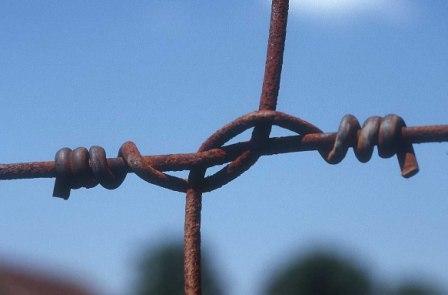The news last week was again full of Colonel Gaddafi – and we now read rumours of him planning to launch cluster bombs, banned in 100 countries, on the opposition in Libya. As we enter Holy Week, let’s pray in a way that reflects that the cross’s outrageous mercy stretches wide enough to embrace oppressors.

For this is the shocking grace and love that God offers to us through his Son. It reaches low enough to touch the poor, the humble, the broken and the abused, and to lift them up into a restoring relationship with their Father. So much so that the Pharisees refused to believe it. They couldn’t imagine that God in his holiness could stoop to relate to those who represented the dirt, and the dregs of the human condition.
At times we are like the Pharisees too. We struggle to accept that no-one is too low or broken for God’s uplifting love. But I think often we struggle to accept the width of the cross too – that Christ’s love stretches far enough to offer redemption to those way beyond where we would draw the line. In a similarly Pharisaical attitude, if we are honest, we would rather apply the law, than grace, to those who oppress, abuse, or damage the vulnerable.
But God’s grace is for the breaker as well as the broken. And we have to allow God to enlarge our hearts with his mercy so that we can pray for these people too.
We know who they are, for they are who we would naturally pray against – though they may be different depending on our political convictions or personal experiences. They are the people that we have labelled as ‘abusers’, ‘criminals’ or ‘terrorists’ – and we forget their identity as children of God, and as image-bearers, however tarnished, of Jesus himself.
I still remember the first time I heard the Delirious? song, ‘Mothers of the night’. It gave me goose bumps. In it, Martin Smith reflects on his discovery that in Mumbai, India, there are mothers whose only hope of providing for their children is through sex work – and often the only place for the children to hide is under the bed.
The extreme desperation that leaves a mother with no choice but to do this is shocking. But that wasn’t what I found most unsettling about this song. It was the words in the bridge section – ‘Wash me whiter than the snow. I am guilty. I threw the stone.’ There is no parallel confession in the song for the mother to sing. The only repentance expressed is from the voice of the bystander – who must turn from the role of judge that he has been tempted to take.
It’s profoundly uncomfortable, but then so is the passage, and the expression of Jesus’ grace that inspires it (see John 8:6-8).
It’s time to put down our stones and pray for God’s mercy to come and do it’s transforming work. Jesus’ words from the cross ring with a challenge to us as we seek to follow him, even in his suffering – ‘Father, forgive them for they do not know what they do.’
To be honest, there are some people in our world who seem to know exactly what they are doing. But we are charged to love our enemies, and to bless those who persecute us.
This is incredibly hard. And what seems even harder than that is to bless those who persecute others. But standing up for the poor does not mean we should harbour hatred for those who oppress them. That is not the way of the cross. Instead, it’s about dying to self for the love of others who deserve death.
There is a fine line between righteous anger and self-righteous condemnation. And judgement is not ours. It is the Lord’s.
The fact is there are some people we would rather not see saved. Because in our eyes they simply do not deserve it. But as we admit this is the reality of our hearts, we are forced to examine our own actions and motives again – for we do not deserve God’s salvation or forgiveness either.
We are all oppressors. We all nailed him to the cross.
At different times in our lives we have all betrayed people like Judas did, or washed our hands of injustice like Pilate did. Some of us have stood in the crowd shouting abuse at God, and others have denied Christ like Peter did. Some of us have beaten innocent people down and others have crucified reputations for the sake of personal status.
But Jesus’s love welcomes all of us sinners – lifting us from the shame of despair and failure, and beckoning us back from chasing the extremes of pride and power.
This is the resurrection hope. It reaches down far enough beneath society’s rejection to a prostitute like Mary Magdalene. It whispers acceptance that lifts her up and releases her from oppression into her destiny as one of the greatest worshippers the world has ever seen (Matthew 26:6-11).
And it stretches wide enough beyond human decency to soften the heart of a murderer like Paul so that with the blood barely cleaned from his hands, an oppressor becomes an apostle full of the way and the truth.
So this Holy Week, let us lift Libya, Zimbabwe, The Ivory Coast, and any other difficult, unjust situation to God in the context of his grace. Let’s ask him to give us hearts soft enough to pray for mercy as well as justice.
And let’s pursue a faith large enough to believe that he is big enough to transform situations in the most radical way imaginable – by turning the heart of oppressors to him so they trade swords for ploughshares, tears for joy, and oppression for love.
For this is the miracle of Easter.
See our written intercessions – praying for oppressors